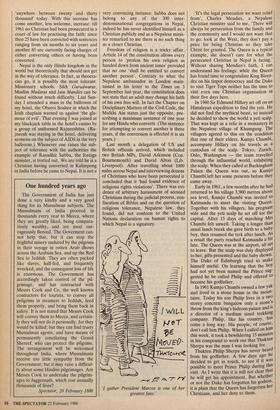FIDEI DEFENSOR?
The Queen revisits a country where Christians are being
persecuted. By Dhiren Bhagat Katmandu WHEN the Queen last came here, exactly 25 years ago, Nepal was just joining the modern world. In 1950 it had emerged from the almost total isolation the Ranas the local Shogunate — had imposed on It. In 1951 Nepal got its first daily newspap- er, in 1956 its first motorable road, and in 1959 its first university.
The Queen's visit in 1961 accelerated the modernisation in touching ways. In prepa- ration for the great event documentary films of the coronation were viewed by the Nepalese authorities. Inspired by the alu- minium .decorative arches that had span- ned the streets of London on the occasion, the authorities proceeded to cut down an avenue of ancient jacaranda trees and in their place erected unshapely bamboo arches. From the centre of each arch hung flowers and three balloons, two spherical and one elongated. By the time the Queen drove into the city much of the air had escaped from these balloons and they hung limp before her.
Throughout Katmandu lightless traffic lights with pagoda roofs went up, their red, green and amber eyes simply painted on. Pagoda-roofed letter boxes that were hard- 1Y designed to take letters sprouted on street corners and the road from the airport was carpeted with vermilion. It Wasn't all innocent colour, of course. Only Months before, the prime miniser had been IMPrisoned, his party — which enjoyed a Majority — dismissed from office and Parliament dissolved. The monarch had declared a state of emergency and when the Queen arrived, thousands of security men were prowling the streets, anxious lest the underground Nepali Congress make its Presence felt. But even so it was the unsophisticated charm of Nepal that made the greatest impression. I quote from the late Desmond Doig's as yet unpublished book, My Kind Of Katmandu his account of the state banquet at Singha Durbar:
The Queen of England, who had disappointed the expectant Nepalese earlier by wearing the simplest dresses and a strand or two of pearls, came shimmering in the famous emerald tiara, emerald necklace, emerald drop earrings and diamonds everywhere even embroidered into her Hartnell gown.
But then this is Nepal and between the Crystal reception and the crystal banqueting hall is a hall of distorting mirrors so that the Queen and Prince Philip were now dwarfs, now possessed of giraffe necks, now spreading like atomic clouds, now disappearing altogether.
Twenty five years on, no such mutations occurred. The Singha Durbar was substan- tially burnt in 1973 and though the hall of distorting mirrors was not ravaged by the fire, the state banquet this time was held at the Narayanhity royal palace, a modern grey and pink monstrosity which the cor- respondent of the Daily Telegraph de- scribed as an 'Oriental power station' and which the travelled Nepalese have nick- named `Paddington'.
Nepal has changed. As the government- owned newspaper The Rising Nepal recent- ly predicted in its eccentric English: 'The royal couple will find a sea change in the Nepal advanced and developed of today from the Nepal of 1961.' You bet. There was no vermilion on the roads, and no balloons, limp or otherwise. Instead, smart Nepalese and British flags lined the newly cleaned roads, and security men. As the Queen drove down the Arniko Highway (built by the Chinese in the late 60s) in a sleek black six door Mercedes 600 (it was `It might have been nice to hear right wing rubbish for a change.' an Austin Princess the last time), she passed the newly built Everest Sheraton Hotel whose guests had been warned not to look out of their windows as the royal motorcade passed lest they be mowed down by snipers.
In the 25 years since the Queen's last visit the population of Nepal has increased from 9.41 million to 16.62 million, the number of doctors in the country has risen from 128 to 630 and there has been a twentyfold increase in the number of tele- phone lines (from 1,120 to 22,580). Of course those have not been the only changes. The government handouts did not supply us with the figures for the increase in drug addiction, nor for that matter did they inform us as to the increase in the number of Christians in Nepal. But my information has it that the latter has shot up from 0 in 1950 to about 800 in 1970 and `anywhere between twenty and thirty thousand' today. With this increase has come another, less welcome, increase: till 1961 no Christian had been prosecuted in a court of law for practising the faith: since then 25 have been convicted with sentences ranging from six months to six years and another 85 are currently facing charges of either converting others or having been converted.
Nepal is the only Hindu kingdom in the world but theoretically that should not get in the way of tolerance. In fact, as theocra- cies go, it is possibly the most tolerant. Missionary schools. Sikh Gurudwaras, Muslim Madaras and Jain Mandirs can be found without much difficulty. Last Sun- day I attended a mass in the ballroom of my hotel, the Oberoi Soaltee in which the Irish chaplain warned us against 'the gla- mour of evil'. That evening I was joined at my blackjack table in the hotel's casino by a group of uniformed Rajneeshites. (Ra- jneesh was staying in the hotel, delivering sermons on the subject of AIDS in the very ballroom.) Whenever one raises the sub- ject of tolerance with the authorities the example of Ranadhir Subba, the foreign minister, is trotted out. We are told he is a Christian having converted in Kalimpong in India before he came to Nepal. It is not a very convincing instance: Subba does not belong to any of the 300 inter- denominational congregations in Nepal, indeed he has never identified himself as a Christian publicly and as a Nepalese minis- ter remarked to me there is no such thing as a closet Christian.
Freedom of religion is a tricky affair. Article 14 of the constitution allows every person to 'profess his own religion as handed down from ancient times' provided that no one 'shall be entitled to convert another person'. Contrary to what the Nepalese ambassador in London main- tained in his letter to the Times on 3 September last year, the constitution does not state that an adult may change his faith of his own free will. In fact the Chapter on Disciplinary Matters of the Civil Code, the Mulkhi Ain states just the opposite, pre- scribing a maximum sentence of one year for any Hindu who converts. (The sentence for attempting to convert another is three years, if the conversion is effected it is six years.) Last month a delegation of US and British officials arrived, which included two British MPs, David Atkinson (Con. Bournemouth) and David Alton (Lib. Liverpool). After travelling about 1000 miles across Nepal and interviewing dozens of Christians who have been persecuted it concluded that it 'had found evidence of religious rights violations'. There was evi- dence of arbitrary harassment of accused Christians during the judicial process, con- fiscation of Bibles and on the question of religious tolerance, Nepalese law, they found, did not conform to the United Nations declaration on human rights to which Nepal is a signatory.
'I gather President Marcos is one of her greatest fans.' It's the legal persecution we want relief from', Charles Mendies, a Nepalese Christian minister said to me, 'There will always be persecution from the family and the community and I would not want that to go: look at the West, they don't pay a price for being Christian so they take Christ for granted. The Queen is a typical example, she doesn't care for what the persecuted Christian in Nepal is facing.' Without sharing Mendies's faith, I can understand his feelings: while the Queen has found time to congratulate King Biren- dra on his tinpot democracy and the Duke to visit Tiger Tops neither has the time to visit even one Christian organisation in their five days here.
In 1960 Sir Edmund Hillary set off on an Himalayan expedition to find the yeti. He did not find the mythical beast, so instead he decided to show the world a yeti scalp. That was kept as a relic in a monastery in the Nepalese village of Khumgung. The villagers agreed to this on the condition that one of their elders, Kumjo Chumbi, accompany Hillary on his travels as a custodian of the scalp. Tokyo, Zurich, Oslo, Washington — the team travelled through the influential world, exhibiting the scalp. When they called at Buckingham Palace the Queen was out, so Kumjo Chumbi left her some presents before they came away. Early in 1961, a few months after he had returned to his village 3,900 metres above sea level, Kumjo Chumbi was invited to Katmandu to meet the visiting Queen. Together with his villagers, his pregnant wife and the yeti scalp he set off for the capital. After 15 days of marching Mrs Chumbi felt unwell. Taking a longer than usual lunch break she gave birth to a baby boy, then resumed the trek after lunch. As a result the party reached Katmandu a bit late. The Queen was at the airport, all set to leave. But the scalp was duly displayed to her, gifts presented and the baby shown. The Duke of Edinburgh tried to make himself useful. On learning that the boy had not yet been named the Prince sug- gested he be called Philip and offered to become his godfather. In 1961 Kumjo Chumbi owned a few yak and lived in a stone house in the moun- tains. Today his son Philip lives in a two storey concrete bungalow only a stones throw from the king's hideous palace and is a director of a medium sized trekking company. Philip, like his country, has come a long way. His people, of course, don't call him Philip. When I called on him this week, it took a bewildering 15 minutes in his compound to work out that Thukten Sherpa was the man I was looking for.. Thukten Philip Sherpa has never heard from his godfather. A few days ago he decided to get in touch, to see if it was possible to meet Prince Philip during this visit. As I write this it is still not clear that he will get his appointment. But whether or not the Duke has forgotten his godson, it is plain that the Queen has forgotten her Christians, and her duty to them.















































 Previous page
Previous page